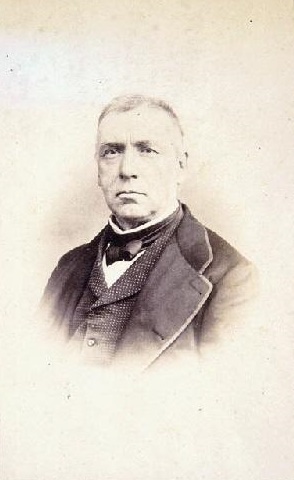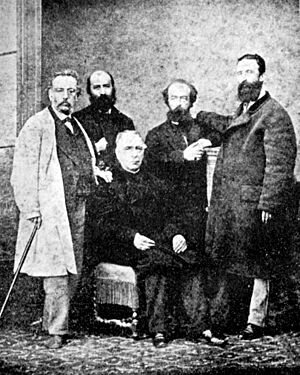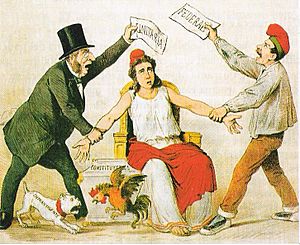José María Orense facts for kids
Quick facts for kids
José María Orense
|
|
|---|---|

Portrait circa 1863 by J. Laurent
|
|
| President of the Congress of Deputies | |
| In office 7 – 12 June 1873 |
|
| Personal details | |
| Born | 14 October 1803 Laredo, Spain |
| Died | 29 October 1880 Astillero, Spain |
| Political party | Progressive Party Democratic Party Federal Democratic Republican Party |
| Occupation | Politician, revolutionary |
| Signature |  |
José María Orense de Milá de Aragón Herrero (1803–1880) was an important Spanish politician. He was also a revolutionary who strongly believed in a "federal republic." This means he wanted a government where different regions of Spain had their own power, but were united under one country. He also had a special title, the Marquis of Albaida.
A Life of Change and Revolution
José María Orense was born in Laredo, Spain, on October 14, 1803. When he was younger, he was part of a citizen army called the Citizen Militia. This was during a time when Spain tried out a new, more liberal government (1820-1823).
He fought against a French army that invaded Spain. Because of this, he had to leave Spain and go to England. He returned to Spain after King Ferdinand VII died.
In 1844, he was chosen to represent Palencia in the Spanish parliament. His ideas were often more radical than the main Progressive Party. He even suggested that Spain and Portugal should unite, an idea called Iberism.
José María Orense inherited the title of Marquis of Albaida in 1847. He took part in the 1848 revolution in Spain, fighting on the streets. He also joined the 1854 revolution. After one attempt to start a rebellion, he was sent to prison.
He worked very hard to end slavery in Spain. He actively campaigned for the abolition of slavery in the parliament between 1854 and 1856.
In 1856, he rebelled against the government again. He was imprisoned once more and then had to leave Spain, going to France and Belgium.

He continued to support the idea of Spain and Portugal uniting. In 1858, he wrote about it, suggesting they could become one country by sharing common interests.
He came back to Madrid during the Glorious Revolution in September 1868. This revolution changed the government in Spain. After this, Orense became the president of the Spanish Abolitionist Society, an organization working to end slavery.
He also led a meeting of the Democratic Party in October 1868. At this meeting, they decided that Spain should become a federal republic. He was a strong supporter of the Republic and was elected to the parliament in 1869.
José María Orense believed in individual freedom and helping workers. He was different from other republicans who leaned more towards socialism. He even blamed socialism for problems in France.
He took part in more uprisings in June 1869 after a new Spanish Constitution was created. In 1870, he went to France and helped organize Spanish volunteers to support France during the Franco-Prussian War. He believed in a "Universal Republic" and a "Latin Federation."
He returned to Spain to vote against Amadeo of Savoy becoming the new King of Spain. He continued to be an active supporter of the Republic. When the First Spanish Republic was declared in February 1873, he briefly served as the President of the Congress of Deputies in June 1873. This meant he was the leader of the Spanish parliament.
After a coup in January 1874, he left Spain again. However, he eventually returned and settled in Astillero, Spain, for his final years. He became blind and his health got worse. José María Orense died on October 29, 1880.
See also
 In Spanish: José María Orense para niños
In Spanish: José María Orense para niños
 | Anna J. Cooper |
 | Mary McLeod Bethune |
 | Lillie Mae Bradford |


